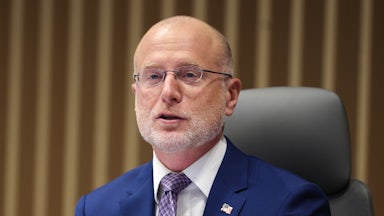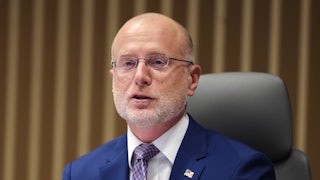When he launched his campaign last week for a Massachusetts U.S. Senate seat, Representative Seth Moulton made sure that one of his first moves was to announce that he is returning campaign donations that he received from individuals affiliated with the American Israel Public Affairs Committee, and would no longer accept campaign support from the group. Also last week, popular podcast hosts Jennifer Welch and Angie Sullivan pressed Senator Cory Booker to answer whether he considered Israeli Prime Minister Benjamin Netanyahu a war criminal; The Ringer’s Van Lathan told Governor Gavin Newsom that Lathan would not support a 2028 candidate who took money from AIPAC, resulting in the governor literally squirming and using the word “interesting” repeatedly; radio host Charlamagne tha God asked Governor Josh Shapiro if AIPAC donations improperly influence U.S. decisions on Israeli-Palestinian issues; and MSNBC’s Eugene Daniels asked Kamala Harris if Israel’s actions over the last two years constitute genocide.
Those are the latest examples of a seismic new development in Democratic politics. For decades, Democratic politicians, particularly those running for Senate or president, have emphasized their support of Israel and commitment to maintaining strong U.S.-Israel ties, in part to woo pro-Israel center-left donors and activists. Now, we are seeing a new litmus test on Israeli-Palestinian issues: Many Democratic pundits and activists, particularly progressives, are demanding politicians rebuke Israel’s actions over the last two years and adopt a more even-handed approach to the Israeli-Palestinian conflict. These progressives say they don’t want to support candidates unless those politicians declare that Israel’s recent actions are a genocide, disavow AIPAC, and pledge to condition U.S. military and diplomatic support on the Israelis treating the Palestinians better.
This new landscape is creating some awkward moments for Democratic officials. After an August interview on Pod Save America in which he refused to give a clear answer on whether he supported a bill that limited U.S. arms sales to Israel, Pete Buttigieg was criticized so widely that a few days later he backed the legislation. Earlier this month, Mallory McMorrow, a Senate candidate in Michigan, was pressed by activists at a campaign event on the genocide question. She “paused for several seconds, exhaled, and responded, ‘based on the definition, yes,’” according to Politico. Two weeks earlier, when asked about it by Politico, McMorrow had declined to use that term.
What’s causing this new dynamic? I see four factors at play.
First of all and most importantly, the Israeli-Palestinian conflict has become one of the defining issues of progressive politics. While there have long been people on the left deeply critical of the Israeli government, what’s changed is that the number of Democratic activists and even average voters who are really invested in this issue, on the pro-Palestinian side, has grown dramatically in the wake of the Israeli military offensive in response to the October 7, 2023, attack by Hamas. We don’t have great data on this, but I strongly suspect that the percentage of Democrats who are familiar with AIPAC (and have negative opinions about the group) has skyrocketed in the last two years.
Moulton, like most Democratic officials, has traditionally defended Israel while not making it a central part of his political identity. His distancing himself from AIPAC suggests that being aligned with the group is electorally toxic in a Democratic primary in a deep blue state like Massachusetts.
“It’s astonishing how quickly the politics are moving. The Democrats now deserting @AIPAC aren’t supporters of Palestinian rights. They’re ambitious politicians who see which way the winds are blowing. They don’t fear @AIPAC. They fear being associated with @AIPAC. The political rules of the last almost half-century are changing before our eyes,” Peter Beinart, a Jewish writer who has become a leading skeptic of the Israeli government, wrote in a recent post on X.
Second, Israeli-Palestinian issues have become a proxy for a broader divide within the Democratic Party. The 2016 and 2020 primaries split the party along ideological lines. But the early years of the Biden presidency diminished those divides. The center-left, led by Biden, accepted some of the left’s criticisms of Bill Clinton’s and Barack Obama’s economic policies and adopted a more populist approach. At the same time, progressives downplayed abolishing the Immigration and Customs Enforcement agency, reducing police funding, expanding Medicare to all Americans, and other stances that Biden-aligned Democrats argued were too electorally risky.
But Biden’s Gaza policy, Kamala Harris’s overtly centrist 2024 campaign, her defeat, the Democratic establishment’s cautious approach to Trump, and the New York City mayoral race have reanimated tensions between the party’s progressive and center-left wings. What many progressives and even some who aren’t really that ideologically left see is a Democratic establishment that keeps losing elections and whimpering in the fight against Trump and Republicans. And they are trying to figure out where Democratic politicians stand on this divide. “Is Israel committing genocide?” or, “Do you oppose AIPAC?” are in many ways a proxy for, “Are your ultimate loyalties with the center-left donors, pollsters, and party leaders or with those of us who want to replace them?”
Politicians, I suspect, recognize that the Israel-Gaza questions aren’t just about Middle East policy. Maine’s Graham Platner may sincerely believe that Israel is committing a genocide in Gaza, but he is likely embracing that term in part because the progressive voters that he is appealing to hold that stance and want to hear it from candidates. Booker, Newsom, McMorrow, Buttigieg, Harris, and many other prominent Democrats get squeamish or deliver word salads when asked about Israeli-Palestinian issues. That’s because they are essentially being asked to align with the party’s centrists or its progressives, but their political brands and strategies are to be palatable to both blocs.
Third, the rise of Zohran Mamdani is reshaping Israeli-Palestinian politics within the party. He won the mayoral primary in New York despite a long record of skepticism about Israel, the city’s sizable Jewish population, and constant accusations that he is antisemitic. Mamdani’s victory has emboldened progressives, who might have backtracked from demanding candidates take Israel-skeptical positions if those proved electorally damaging. If a candidate like that can win a Democratic primary in New York without bowing to the pro-Israel side, it’s likely that such a candidate can win a primary anywhere.
Fourth, there’s the exit of Biden. The presence of a firmly pro-Israel figure at the top of the party probably diminished Israel-skeptical sentiments, even as more Democrats became concerned about the war’s direction in 2024. With Biden out of office, fairly establishment-friendly voices, such as the Pod Save America hosts, can criticize the Israeli government without implicitly slamming their party’s incumbent president.
I don’t want to exaggerate what’s happening. It’s entirely possible that we are in a unique moment that’s over even eight months from now. Memories of the women and children dying from indiscriminate Israeli bombings in Gaza will inevitably fade. Perhaps the recently negotiated ceasefire will be enduring.
And right now, I would argue that it’s not that Israeli skepticism is the new litmus test for the entire party, but that there are two different litmus tests for Democratic politicians. A candidate who wants to woo center-left Democratic donors and activists still needs to affirm certain pro-Israel positions. In his statement breaking with AIPAC, the fairly centrist Moulton emphasized his support for Israel existing as a Jewish-controlled state and that he is a “friend of Israel.” At the same time, those who want to win over progressive activists will have to be critical of AIPAC and U.S. military aid to Israel. It will be very tricky for candidates to meet both tests. And it’s entirely possible that the 2028 Democratic presidential nominee is from the pro-Israel camp, since most polls suggest Israel-Gaza issues are not the biggest concern of average Democratic voters.
But those issues weren’t voters’ biggest concern five or 10 years ago, either, when many Democratic politicians worked intensely to court the party’s pro-Israel contingent. Booker, who has forcefully defended Israel throughout his career and in the past emphasized his close ties to AIPAC leaders, whined in the interview with Welch and Sullivan that their question about whether Netanyahu is a war criminal is a “litmus test.” It is. But what’s actually changed is that ambitious politicians like Booker, who have for years been confronted with and then adhered to pro-Israeli litmus tests, now have to address the other side of the issue. It’s about time.










